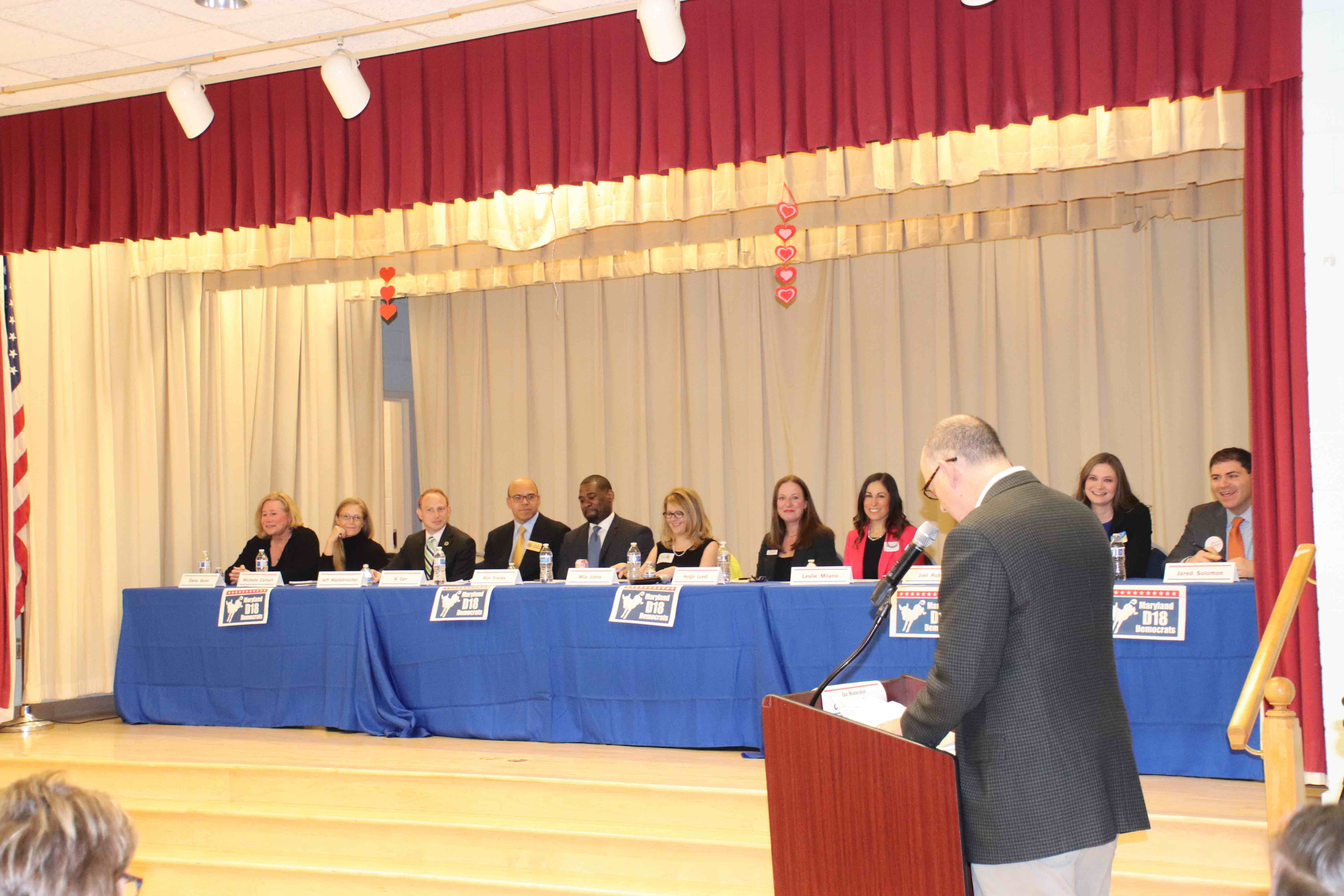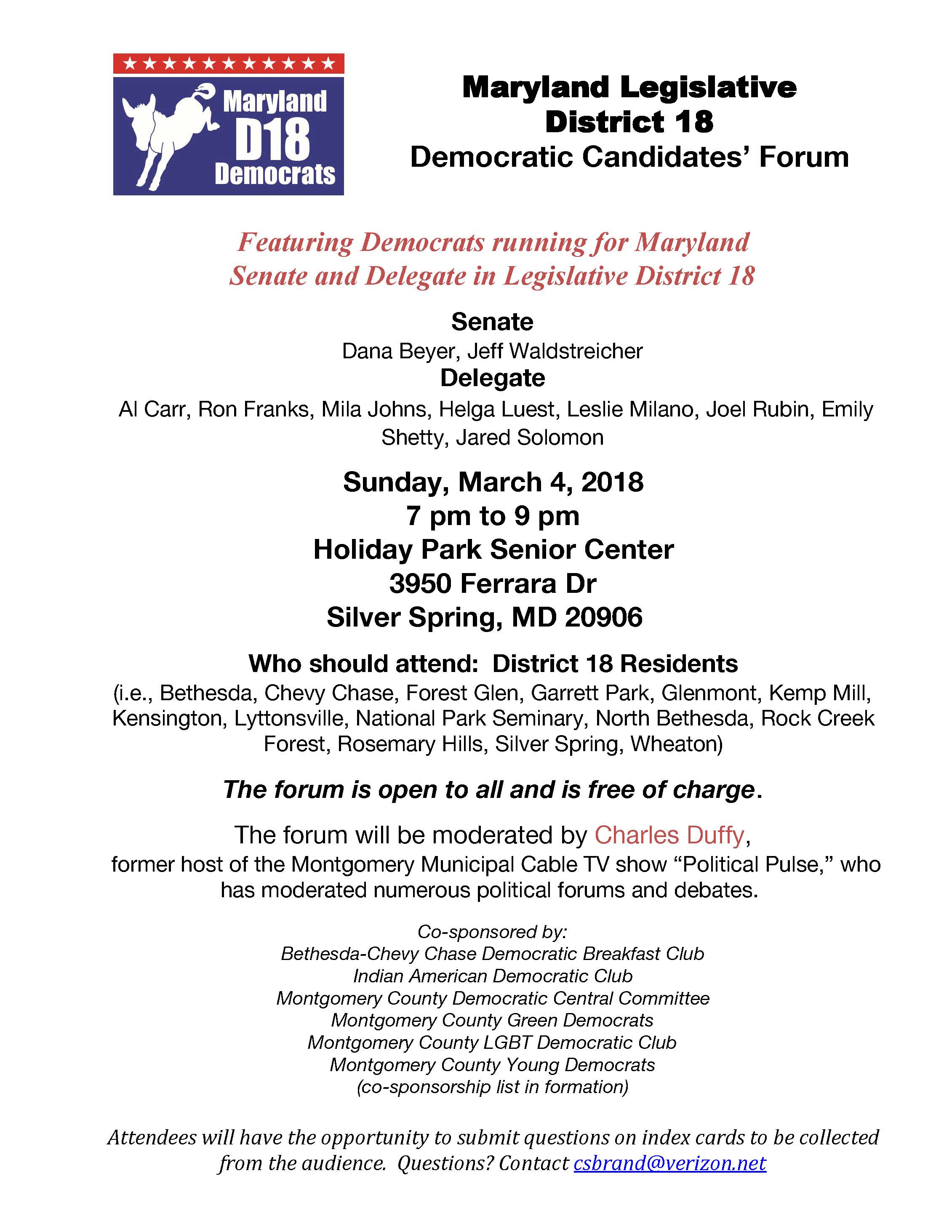 Last night, your scribe attended and live tweeted the District 18 state legislative debate sponsored by the District 18 Democratic Caucus. Though policy differences continue to be somewhat hard to find, voters could still glean much from what was said–and not said–as well as about the style and experience of the candidates.
Last night, your scribe attended and live tweeted the District 18 state legislative debate sponsored by the District 18 Democratic Caucus. Though policy differences continue to be somewhat hard to find, voters could still glean much from what was said–and not said–as well as about the style and experience of the candidates.
State Senate Candidates
Dana Beyer possesses limitless self-confidence often associated with doctors. At one point, she tried to tell Moderator Charles Duffy how to conduct the debate. Highly intelligent, her most thoughtful response was about how the General Assembly’s first priority ought to be to undergird the healthcare system against federal attacks.
Towards the end of the debate, Dana declared that there is almost no policy diversity among the candidates, so voters need to elect someone who can bring the delegation together and lead. Unfortunately, she has a well-earned reputation of not working well with others.
While Dana gave voters a real opportunity to learn her views on a range of issues, Jeff Waldstreicher was reticent to the point of not speaking for the first 75 minutes. Loathe to say anything divisive, Jeff passed on opportunities to outline his views on issues such as liquor decontrol or single-payer healthcare.
Jeff finally spoke up to tout past and expected gun control legislation. A classic example of what political scientists call “credit claiming,” he steered clear of the more divisive issue of armed guards in schools. Complimenting Del. Al Carr’s work effusively, Jeff wooed his support. Jeff’s strategy is seemingly to avoid alienating any voters and run a focused “positive campaign” that ignores his challengers.
This was my first view of Michelle Carhart, the owner of a local chain of children’s gyms who jumped into the race at the last moment. Much less the pol than her two opponents, she came to the debate with the perspective of a local business owner who sees a need for both less bureaucracy and progressive change.
She complained about property taxes, and favors training over handouts as more useful and less demeaning. She argued that everyone should have to pay something for healthcare, so they’d have some skin in the game. Michelle has a lot to learn about public policy but could appeal to people looking for an ordinary citizen rather than a more practiced politician.
House of Delegates Candidates
Incumbent Del. Al Carr (who I support) demonstrated his comfortable policy knowledge on a number of issues and self-deprecatingly to laughter from the audience asked voters to send him as a “grizzled veteran” back to Annapolis after complimenting the strengths of the other candidates. He continues to emphasize the environment and climate change as a critical issue.
Since her respectable loss four-years ago in the primary, Emily Shetty has worked hard to position herself for this race by chairing the D18 Caucus and serving on the central committee. Among the most eloquent candidates, she advocated firmly for single-payer health care and is able to discuss the subject more fluently than many experienced legislators.
One of my favorite moments was when Ron Franks argued against the prevailing wisdom on police officers in schools. Making the case for people with diverse experiences by applying his own, he made a good argument that police officers serve as valuable role models and revealed a willingness to dissent thoughtfully.
Mila Johns stood out as someone unafraid to say what she thinks. In particular, when other candidates held back initially, she stated that the county should gradually get out of the liquor business because it’s killing off restaurants. She also advocated for making it easier for seniors to age in their own homes and death with dignity.
Joel Rubin highlighted his experience as an elected local official and seasoned policy advocate who has the communication skills and knowledge to fight for progressive ideals. Living with his mother-in-law (lovely woman, I’ve met her), he argued for incentives for multi-generational housing as one component to addressing senior living.
Helga Luest did not reprise her accusations against Jeff Waldstreicher at the debate. Speaking as the survivor of a murder attempt, she argued passionately for a trauma-centered approach and greater community connectivity to help address issues from kids prone to gun violence to isolated seniors. She believes a delegate should engage on leadership at the community level as well as outside the general assembly.
Jared Solomon’s answers gave the impression of someone who has studied the issues hard and would listen well but advocate forcefully. Labor should appreciate his advocacy of labor agreements as part of business incentive packages. He said education was his #1 priority. I hope higher pay for college professors is included!
Among the more knowledgeable candidates, Leslie Milano stood out as someone who would consistently advocate for economic growth. She referred to Amazon and Marriott tax incentives as normal business practices, which struck me less as politics as usual than someone who was being honest about the way the world works.
Issue Differences!
General similarities notwithstanding—everyone is anti-gun, pro-choice and wants to fight climate change—there was daylight between the candidates on a number of questions. While Leslie Milano expressed support for incentives to attract Amazon, Al Carr advocated investing in education and infrastructure that benefit all businesses. Emily Shetty wanted transparent negotiations, which was very popular, albeit wholly unrealistic. Dana Beyer said attracting Amazon is more important than keeping Marriott. Jeff Waldstreicher expressed no opinion.
Mila Johns, Ron Franks, Dana Beyer and Leslie Milano expressed support for getting the county out of the liquor business. I’d also like to know the opinion of other candidates.
In the most depressing part of the debate, Joel Rubin said he was okay with armed security guards if schools need them. Helga Luest highlighted the need for risk and threat assessment. Mila Johns and Leslie Milano opposed them with Leslie mentioning their impact on the culture of schools and suggesting bulletproof pods as an alternative.
Winner of the Debate
Adam Pagnucco. Hands down.
Candidates and the moderator referred to his posts here on Seventh State repeatedly with admiration.

